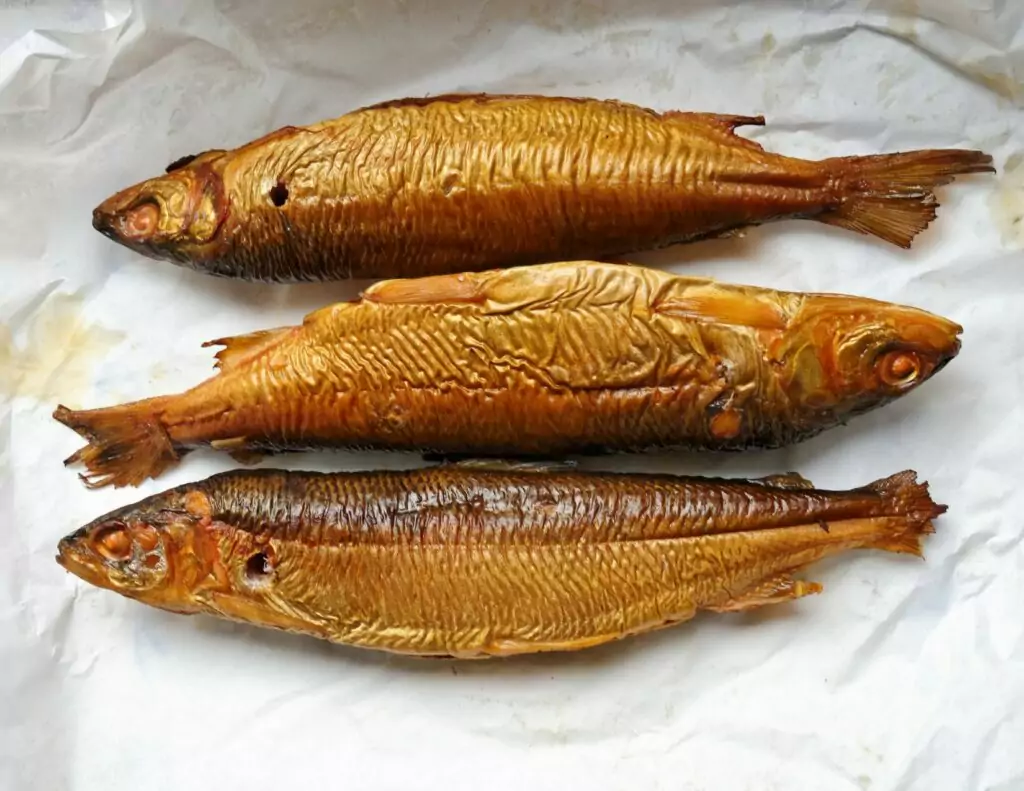There’s nothing fishy about smoked eating in Michigan! A staple of Anishinaabe foodways, smoked fish has been a part of the Michigander, and human, diet since the invention of fire and fishing. The smell of smoke and seafood brings to mind the weathered wooden siding of Leland’s historic Fishtown, where Carlson’s Fishery sells their famous whitefish pâté.
While smoking fish is an ancient technique, nowadays, producers follow strict food safety plans to ensure a safe product, and eaters can devour dependably on Michigan-smoked seafood. For those hoping to smoke their own catch, be sure to check your area’s Eat Safe Fish Guide for more information.

Types of Michigan Smoked Fish
Whitefish
Per the DNR, whitefish is a Michigan staple for fisheries because of its “exceptional flavor, convenient size, and habit of schooling.” Whitefish are found in depths of 200 feet or lower throughout Lake Michigan, Huron, Erie, and Superior and are often caught with trap nets. According to the Michigan Sea Grant, Indigenous foodways include powdered smoked whitefish used in dishes, or mixed with fresh blueberries.
Lake Trout
These native fish are found in all five Great Lakes and in inland waters such as Higgins, Elk, Torch, and Crystal Lake. Often reported to have a more ‘fishy’ taste, a more recent change in diet has changed the flavor of some Michigan populations.
Salmon
Both Coho and Chinook salmon are transplanted species in the Great Lakes since 1967, supported by the Platte River State Fish Hatchery and other hatcheries statewide. Atlantic salmon were once native to Lake Ontario, but today’s fish were supported by a reintroduction in 1972, as well as a yearly spawning run on the St. Mary’s River. Smoked salmon can be claimed by many cultures, but is well-known for its place in the classic delicatessen bagel sandwich with capers and cream cheese.
Lake Herring
Also known as Cisco, this native species is commercially fished in Lake Superior and Lake Huron’s North Channel, but is being affected by climate change and other man-made environmental changes, and has disappeared from over 20 percent of their native lakes. According to Freshwater Feasts, most cisco is either smoked whole or eaten as roe marketed as ‘Lake Superior Gold.’
How Long Does Smoked Fish Last?
Fish can be smoked using two methods: cold or hot. Cold smoking does not cook the product, but instead dehydrates it, allowing for slower bacterial growth and therefore a longer shelf life. According to Oregon State University, cold smoked fish can be kept anywhere from 21-49 days depending on how it’s cut.
Hot smoking is much more prevalent. In this method, fish is fully cooked, and should be eaten or frozen soon after. Per FDA regulations, smoked fish can be frozen for up to 2 months. As always, be sure to trust your nose and sense of taste – treat hot-smoked fish as you would fresh fish!
Find Local Smoked Fish
Michigan fresh and smoked fish can be found by location using our Find Food and Farms Database.
Michigan Smoked Fish Recipes
Try these local-focused recipes for using your smoked fish!
Claire Butler is the Content Strategy Specialist for Taste the Local Difference. Contact her at [email protected].
